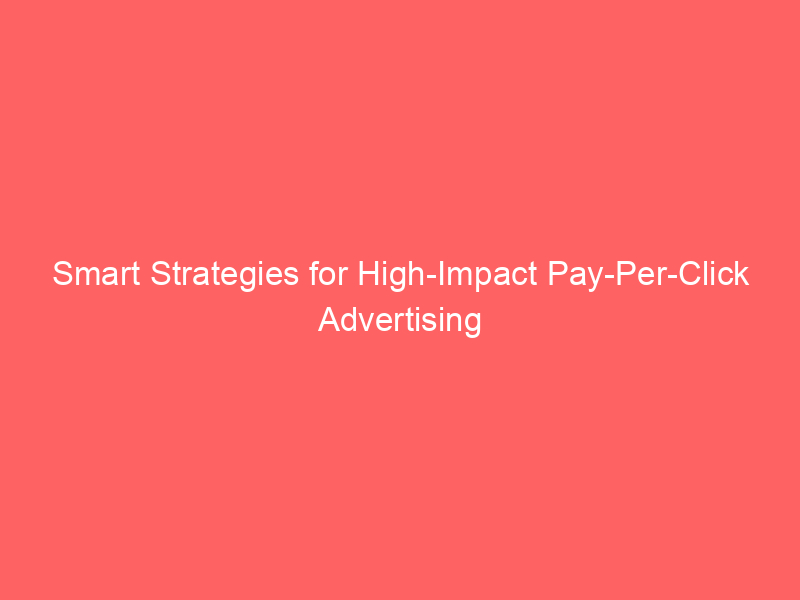Smart Strategies for High-Impact Pay-Per-Click Advertising
In today’s fast-paced digital marketplace, standing out is more challenging than ever. Businesses are in a relentless pursuit to capture attention, drive traffic, and boost sales. Enter Pay-Per-Click (PPC) advertising—a powerful tool that, when wielded correctly, can propel your brand to new heights. But how can you ensure your PPC campaigns are not just effective, but truly impactful? Let’s delve into the smart strategies that can transform your PPC efforts.
Understanding the Power of PPC
Before we dive into strategies, it’s essential to grasp why PPC is a game-changer. Unlike organic marketing, which requires time to build momentum, PPC offers immediate visibility. By bidding on relevant keywords, your ads appear at the top of search engine results, ensuring your target audience sees you first. This immediacy is invaluable, especially in competitive industries where being top-of-mind can make all the difference.
1. Conduct a Comprehensive PPC Audit
Imagine setting sail without a map—risky, right? The same applies to PPC campaigns. A thorough PPC audit serves as your navigational chart. It involves analyzing your current and past campaign data to identify what’s working and what’s not. By examining metrics such as click-through rates (CTR), conversion rates, and cost per conversion, you can pinpoint areas of improvement. This audit lays the foundation for refining your strategy and maximizing ROI.
2. Leverage Advanced Google Ads Management
Google Ads remains a cornerstone of PPC advertising. However, merely running ads isn’t enough. Advanced management entails:
- Keyword Optimization: Identifying high-performing keywords and eliminating underperforming ones.
- Ad Copy Testing: Crafting compelling ad copies and conducting A/B tests to determine which resonates best with your audience.
- Bid Adjustments: Modifying bids based on device, location, and time to ensure optimal ad placement.
By meticulously managing these elements, you can enhance your ad performance and ensure your budget is utilized effectively.
3. Expand Your Reach with Bing Ads
While Google dominates the search engine market, neglecting Bing means missing out on a significant audience segment. Bing Ads often have less competition, resulting in lower costs per click. By integrating Bing Ads into your PPC strategy, you can tap into this underserved audience, potentially achieving higher conversion rates at a reduced cost.
4. Implement Strategic Remarketing Ads
Ever noticed how products you viewed online seem to follow you around the internet? That’s remarketing in action. This strategy involves targeting users who have previously visited your website but didn’t convert. By displaying tailored ads to these warm leads, you increase the likelihood of conversion. Effective remarketing requires:
- Segmenting Your Audience: Categorize visitors based on their behavior on your site.
- Customized Ad Creatives: Design ads that address the specific interests or objections of each segment.
- Frequency Capping: Ensure your ads don’t become intrusive by limiting how often they’re shown to the same user.
5. Harness the Power of Social Ads
Social media platforms are goldmines for audience engagement. Platforms like Facebook, Instagram, and LinkedIn offer sophisticated targeting options, allowing you to reach users based on demographics, interests, and behaviors. To maximize the impact of social ads:
- Utilize Eye-Catching Visuals: Invest in high-quality images or videos that capture attention.
- Craft Engaging Copy: Write concise, compelling messages that encourage users to take action.
- Monitor and Adjust: Regularly review performance metrics and adjust your strategy accordingly.
6. Optimize for eCommerce with Specialized Ads
For eCommerce businesses, PPC can be a significant revenue driver. Specialized eCommerce ads, such as Google Shopping Ads, showcase your products directly in search results with images, prices, and product names. To excel in eCommerce PPC:
- Ensure Accurate Product Feed: Keep your product information up-to-date and error-free.
- Use Negative Keywords: Exclude terms that are irrelevant to prevent wasted spend.
- Leverage Dynamic Remarketing: Show previous visitors ads featuring the exact products they viewed, increasing the chances of conversion.
7. Embrace Data-Driven Decision Making
In the realm of PPC, data is your best friend. Regularly analyze performance metrics to inform your strategy. Key metrics to monitor include:
- Cost Per Click (CPC): The amount you pay for each click on your ad.
- Click-Through Rate (CTR): The percentage of users who click on your ad after seeing it.
- Conversion Rate: The percentage of clicks that result in a desired action, such as a purchase or sign-up.
By keeping a close eye on these metrics, you can make informed decisions to optimize your campaigns continually.
8. Stay Ahead with Competitive Analysis
Understanding what your competitors are doing can provide valuable insights. Tools like SEMrush or Ahrefs allow you to see which keywords your competitors are bidding on, their ad copies, and overall strategy. This information can help you identify gaps in your own strategy and uncover new opportunities.
9. Focus on Mobile Optimization
With the increasing use of smartphones, ensuring your ads and landing pages are mobile-friendly is crucial. Mobile optimization includes:
- Responsive Design: Ensure your landing pages look and function well on all devices.
- Fast Loading Speeds: Mobile users are often on-the-go; slow pages can lead to high bounce rates.
- Click-to-Call Extensions: Make it easy for users to contact you directly from the ad.
10. Test, Learn, and Iterate
The digital landscape is ever-evolving, and so should your PPC strategies. Regularly test different elements of your campaigns—from ad copy to landing page design—and learn from the results. Continuous iteration allows you to refine your approach, ensuring sustained success.
Conclusion
Navigating the complexities of PPC advertising requires a blend of strategic planning, continuous learning, and adaptability. By conducting thorough audits, leveraging advanced management techniques, and embracing data-driven decision-making, you can create high-impact PPC campaigns that drive significant results. Remember, in the dynamic world of digital marketing, staying informed and agile is key to maintaining a competitive edge. If you’re seeking affordable PPC services to elevate your business, consider partnering with experts who can guide you through this journey.








